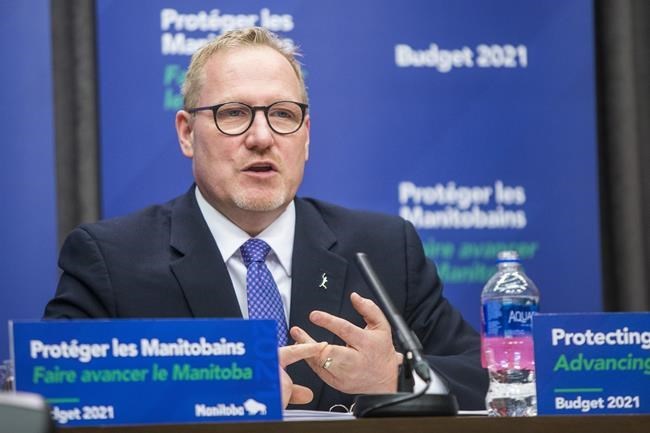WINNIPEG — Manitobans will soon pay less in property tax but fork out more to stream movies or buy certain goods online.
The Progressive Conservative government’s 2021-22 budget released Wednesday includes some long-promised tax relief, some new tax revenues from the digital economy and millions of dollars in promised COVID-19 relief.
“Our plan is to really protect Manitobans through COVID-19 and advance the provincial economy past the pandemic,” Finance Minister Scott Fielding said.
The budget includes the first step in a plan to phase out education taxes on property and instead fund schools directly from provincial coffers.
Residential and farmland owners are to receive a 25 per cent rebate this year, while owners of commercial and other land are to get a 10 per cent rebate. The rebates are to be cut again by equal amounts next year, resulting in total savings of $1,100 for the average homeowner, the government said.
The province also plans to cut vehicle registration fees by 10 per cent as of July and is to eliminate the provincial sales tax from spa and salon services starting in December.
Businesses are to get a tax break to encourage hiring. The threshold at which companies start to pay the province’s payroll tax is to rise in January to $1.75 million from $1.5 million of total payroll. The threshold at which companies pay a higher rate will rise to $3.5 million from $3 million.
Taxes elsewhere, however, are increasing. Digital streaming services such as Netflix and Spotify can expect to be subject to the provincial sales tax as of Dec. 1, as will online accommodation bookings through companies such as Airbnb. The move brings Manitoba in line with most other provinces.
Online marketplaces such as Amazon and Best Buy will have to start collecting provincial sales tax on items sold by third parties as of Dec. 1. They are already required to collect the tax on items they sell directly. Used items sold privately by individuals through sites such as Kijiji will continue to be exempt.
“We think there’s an advantage in levelling the playing field with local suppliers,” Fielding said.
The budget forecasts a $1.6-billion deficit this fiscal year on total spending of $19.4 billion. It's the second-highest deficit in the province’s history, behind last year’s $2-billion mark.
The opposition parties said the property tax cuts will be costly.
"It's coming from underfunding seniors care ... it's coming from underfunding the education system," NDP Leader Wab Kinew said.
"That's not the right approach, least of all while the pandemic is still ongoing."
Liberal Leader Dougald Lamont said the property tax cut will mainly benefit people who are already well off.
"It's overwhelmingly geared to helping people ... who don't need help."
Premier Brian Pallister disagreed.
"Given the insecurities of COVID and the realities of what it's done ... I think this is the right time to give Manitobans a little bit of a break."
The government is also promising more help for health care and the economy as the pandemic continues.
More than $62 million is being committed to boosting job creation and workforce training, Fielding said. Some $25 million is to be put up to help employers hire students and young adults.
A day before the budget, Fielding promised $1.2 billion in COVID-19 spending for things such as protective equipment and extra staffing at vaccination centres, although the budget provided few details.
Labour leaders said the province must do much more to speed up vaccinations and protect front-line workers.
"Instead of making urgent investments needed to address the ongoing COVID-19 pandemic ... they are pushing forward with unaffordable tax cuts," Michelle Gawronsky, president of the Manitoba Government and General Employees' Union, said in a written statement.
To help renters, the guideline for increases in rent-controlled units will be zero in 2022 and 2023, following a 1.6 per cent increase this year. Landlords who want to raise rents above the guideline must demonstrate that the guideline amount would not cover cost increases they face.
This report by The Canadian Press was first published April 7, 2021
Steve Lambert, The Canadian Press



